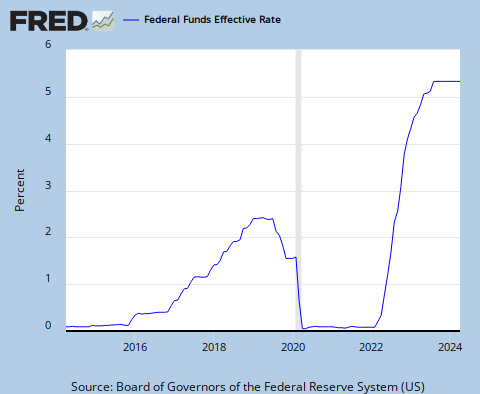 Image via Wikipediaby Paul Krugman
Image via Wikipediaby Paul KrugmanWay back, when I spent a year in the government, an old hand told me that fighting bad ideas is like flushing cockroaches down the toilet; they just come right back. I’m having that feeling a lot lately, on at least two fronts.
One is the crowding out issue. I keep encountering both the same old misunderstanding of Ricardian equivalence, and people citing evidence from periods when the economy was nowhere near the zero lower bound. The latter was, perhaps, excusable when the idea of a liquidity trap was still new; but folks, we’ve been at the ZLB for two and a half years now:

The other is the whole “the Social Security trust fund doesn’t exist” thing. I’ll just repeat what I said back when Bush was trying to push through privatization:
Social Security is a government program supported by a dedicated tax, like highway maintenance. Now you can say that assigning a particular tax to a particular program is merely a fiction, but in fact such assignments have both legal and political force. If Ronald Reagan had said, back in the 1980s, “Let’s increase a regressive tax that falls mainly on the working class, while cutting taxes that fall mainly on much richer people,” he would have faced a political firestorm. But because the increase in the regressive payroll tax was recommended by the Greenspan Commission to support Social Security, it was politically in a different box – you might even call it a lockbox – from Reagan’s tax cuts.
The purpose of that tax increase was to maintain the dedicated tax system into the future, by having Social Security’s assigned tax take in more money than the system paid out while the baby boomers were still working, then use the trust fund built up by those surpluses to pay future bills. Viewed in its own terms, that strategy was highly successful.
The date at which the trust fund will run out, according to Social Security Administration projections, has receded steadily into the future: 10 years ago it was 2029, now it’s 2042. As Kevin Drum, Brad DeLong, and others have pointed out, the SSA estimates are very conservative, and quite moderate projections of economic growth push the exhaustion date into the indefinite future.
But the privatizers won’t take yes for an answer when it comes to the sustainability of Social Security. Their answer to the pretty good numbers is to say that the trust fund is meaningless, because it’s invested in U.S. government bonds. They aren’t really saying that government bonds are worthless; their point is that the whole notion of a separate budget for Social Security is a fiction. And if that’s true, the idea that one part of the government can have a positive trust fund while the government as a whole is in debt does become strange.
But there are two problems with their position.
The lesser problem is that if you say that there is no link between the payroll tax and future Social Security benefits – which is what denying the reality of the trust fund amounts to – then Greenspan and company pulled a fast one back in the 1980s: they sold a regressive tax switch, raising taxes on workers while cutting them on the wealthy, on false pretenses. More broadly, we’re breaking a major promise if we now, after 20 years of high payroll taxes to pay for Social Security’s future, declare that it was all a little joke on the public.
The bigger problem for those who want to see a crisis in Social Security’s future is this: if Social Security is just part of the federal budget, with no budget or trust fund of its own, then, well, it’s just part of the federal budget: there can’t be a Social Security crisis. All you can have is a general budget crisis. Rising Social Security benefit payments might be one reason for that crisis, but it’s hard to make the case that it will be central.
But those who insist that we face a Social Security crisis want to have it both ways. Having invoked the concept of a unified budget to reject the existence of a trust fund, they refuse to accept the implications of that unified budget going forward. Instead, having changed the rules to make the trust fund meaningless, they want to change the rules back around 15 years from now: today, when the payroll tax takes in more revenue than SS benefits, they say that’s meaningless, but when – in 2018 or later – benefits start to exceed the payroll tax, why, that’s a crisis. Huh?
More

No comments:
Post a Comment